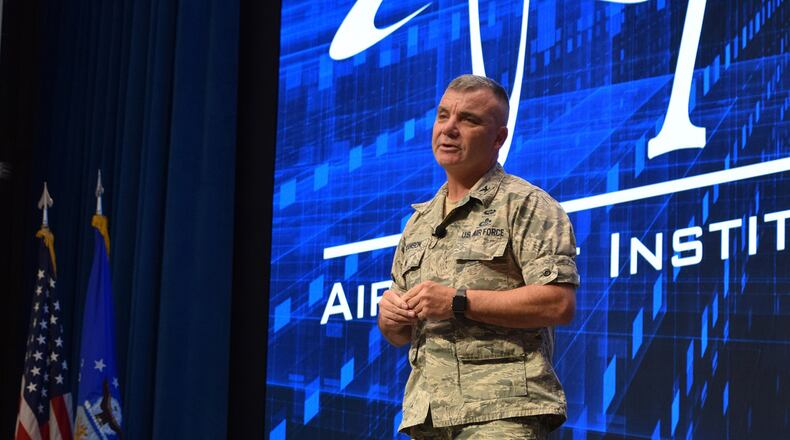Prior to retirement after almost 35 years of service, Swanson was chief, Weather Strategic Plans and Interagency Integration Division, Directorate of Weather, Deputy Chief of Staff, Operations, Headquarters U.S. Air Force, Washington, D.C. The division plans weather, climate and space environmental support for the Air Force Weather functional area and oversees integration of technology and weather into C4I and modeling systems.
Swanson now serves as keynote speaker, senior mentor and advisor to the award-winning “Fight for Each Other” (F4EO Project) suicide prevention program, based in Hawaii. Speakers representing each branch of the five services travel to various locations to share their stories of how suicide has impacted them personally.
Suicide affects the lives of not only military members but their friends, family and coworkers, which isn’t discussed much, Swanson noted.
“That’s the impact that it has on our friends and family. We convince ourselves that we’re doing the world a favor, and what we are doing actually is leaving a big, gaping hole in people’s lives,” he said.
He estimated that half of the 850 AFIT audience members have been affected by suicide.
Suicide recovery and success stories of people who go on to lead highly productive lives also aren’t highlighted much, Swanson said.
He outlined his own story of once being a hard-charging, motivated Air Force captain but one who was feeling the pressure of not meeting his Ph.D. educational goals within a certain timeframe. With family pressures mounting, he made his first suicide attempt using alcohol and pills. He survived, but his marriage did not, and his wife took custody of their two sons.
In desperation, he made another attempt. Ultimately, he connected with a mental health professional who helped him understand that he could come out of his darkness and be happy.
“He said, ‘You’re going to have to trust me. You’re going to have to take some risks. You’re going to have to level a little bit, and we’re going to have to talk about the things that are bothering you and causing you to think in ways that aren’t necessarily healthy,’” Swanson said.
The retired colonel said his key points relating to suicide and suicidal ideation are:
• This can happen to anybody.
• It always gets better – don’t get stuck in the moment.
• Tools are available that help people not only survive but thrive.
• Get help first then address career concerns.
• It takes work to get back on track, but with the support of family, friends and coworkers, you can do so.
• Look for signs that someone is in trouble, but realize some people are very good at masking their depression and pain. Still, people who are experiencing life challenges like divorce or family issues or are exhibiting certain behaviors like drug or alcohol abuse and are isolating themselves may be at risk.
Swanson remained in the Air Force for almost two decades following his recovery from his mental health crises.
“I not only got my career back on track, but I was given the opportunity to lead, manage and motivate some of the finest men and women this nation has to offer,” he said.
He retired to Hawaii, earned another M.B.A. and bought his dream car.
“Look at all of those things I was able to do because I stuck around and because I got the tools that helped me get back on track,” he said. “We’re trying to remove the stigma of seeking help. We can’t do that unless we’re willing to talk, and we can’t do that unless senior leaders are willing to talk about their experiences.
“When we can think about seeking help in the same way that we think about getting a broken arm fixed, we will be light years ahead of what we are today,” he said. “It is not a sign of weakness.”
Swanson closed by telling the AFIT audience: “You are incredible; you are worth it; you are important to your friends, your family, your nation, your service, your coworkers. You are important enough for a crazy old colonel to get on an airplane, take the red eye to a place that’s cold and tell you just how important you are.”
Swanson and mental health professionals from the 88th Medical Group were on hand to talk with audience members.
“We have to start being comfortable with being uncomfortable and having those conversations,” Swanson said.
Col. Rose Tseng, AFIT section commander, helped coordinate the event after attending the Air University Suicide Prevention Summit in the fall of 2019. She said AFIT leadership is implementing an ongoing resiliency program to tackle issues that feedback from the Resilience Tactical Pause identified.
Mental health resources are available
Maj. Robert Atisme, clinical social worker, said anyone experiencing a mental health issue is encouraged to seek help at the 88 MDG’s Mental Health Clinic or the medical center’s emergency room after hours. An on-call provider is available.
“We’ll determine where the patient can be best served,” he said.
For an appointment or assistance, call 937-257-6877.
A host of additional base resources are available, Atisme pointed out, ranging from military family life consultants, chaplains, the Behavioral Health Optimization Program in the Family Medicine Clinic and Military OneSource (https://www.militaryonesource.mil/).
For more information about suicide awareness and prevention, call the Military Crisis Line at 1-800-273-8255 and press 1 or text 838255* visit http://www.afms.af.mil/suicideprevention/.
About the Author
